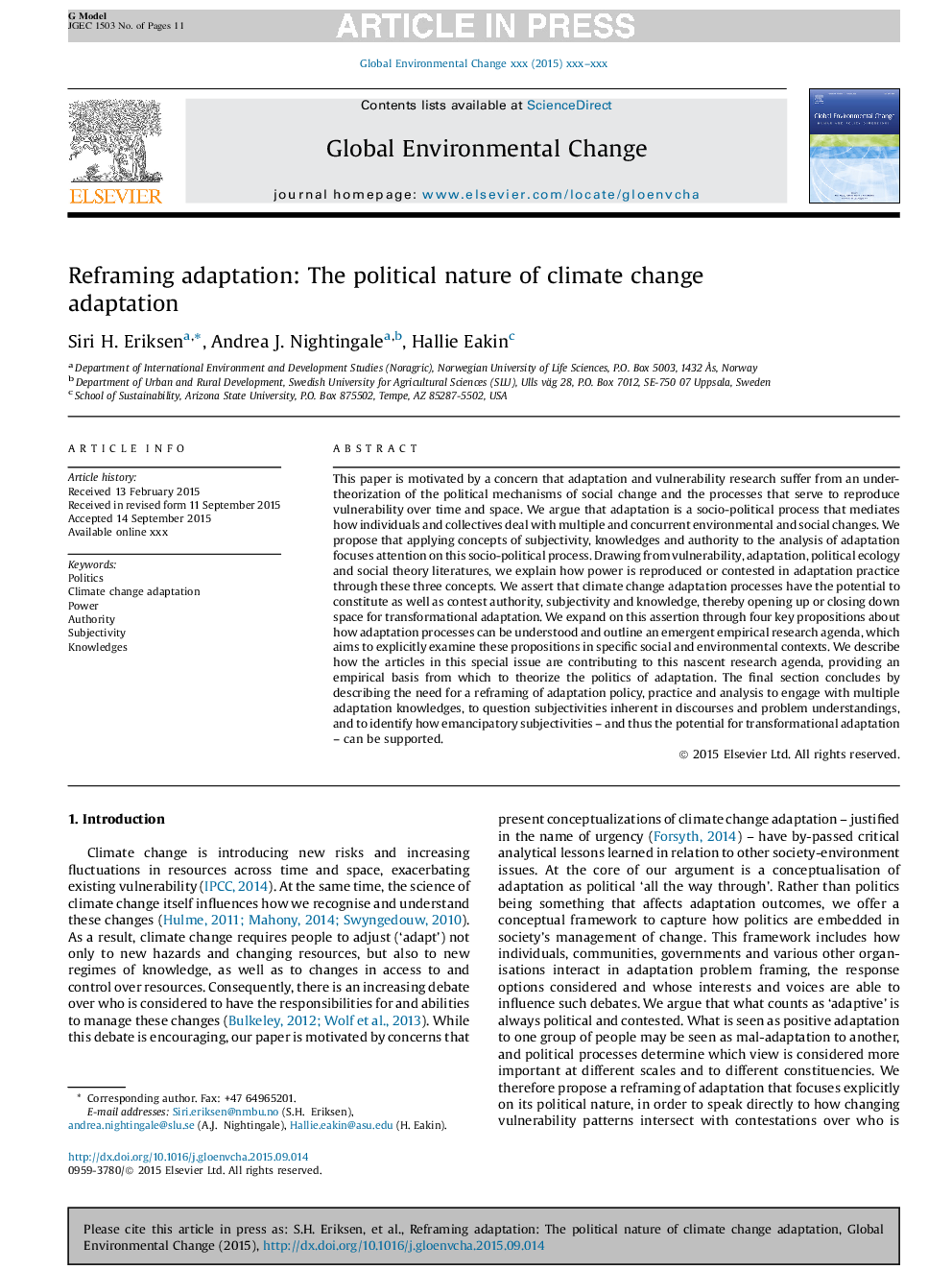| کد مقاله | کد نشریه | سال انتشار | مقاله انگلیسی | نسخه تمام متن |
|---|---|---|---|---|
| 7469565 | 1485123 | 2015 | 11 صفحه PDF | دانلود رایگان |
عنوان انگلیسی مقاله ISI
Reframing adaptation: The political nature of climate change adaptation
ترجمه فارسی عنوان
تطبیق اصلاحات: ماهیت سیاسی سازگاری تغییرات اقلیمی
دانلود مقاله + سفارش ترجمه
دانلود مقاله ISI انگلیسی
رایگان برای ایرانیان
کلمات کلیدی
سیاست، سازگاری تغییرات اقلیمی، قدرت، قدرت، ذهنیت دانش
ترجمه چکیده
این مقاله با نگرانی مواجه شده است که تحقیقات تطبیقی و آسیب پذیری ناشی از عدم نظریه سازی مکانیسم های سیاسی تغییر اجتماعی و فرایندهایی است که به منظور بازتولید آسیب پذیری در طول زمان و فضا، رنج می برند. ما استدلال می کنیم که انطباق یک فرایند اجتماعی-سیاسی است که میان افراد و گروه ها با تغییرات زیست محیطی و اجتماعی متعدد و همزمان مواجه می شود. ما پیشنهاد می کنیم که با استفاده از مفاهیم ذهنی، دانش و اقتدار به تجزیه و تحلیل انطباق، تمرکز بر این فرایند اجتماعی-سیاسی توجه شود. با توجه به آسیب پذیری، سازگاری، محیط زیست سیاسی و ادبیات تئوری اجتماعی، ما توضیح می دهیم که چگونه قدرت را از طریق این سه مفهوم بازتولید می کنیم یا در عمل انطباق مطرح می شود. ما ادعا می کنیم که فرایندهای انطباق تغییرات آب و هوایی، توانایی تشکیل، و همچنین قدرت مسابقه، ذهنیت و دانش، به این ترتیب فضای مناسب برای انطباق تحول پذیر را باز و بسته می کند. ما بر این ادعا از طریق چهار قاعده کلیدی در مورد چگونگی درک فرآیندهای سازگاری و رسم یک برنامه تحقیق تجربی تجربی، که هدف آن صریحا بررسی این گزاره ها در شرایط خاص اجتماعی و محیطی است، گسترش می یابد. ما شرح می دهیم که چگونه مقالات در این موضوع ویژه به این دستورالعمل تحقیق نوظهور کمک می کنند و مبنای تجربی را برای تئوری سیاست های سازگاری ارائه می دهند. بخش آخر نتیجه گیری می شود که توصیف نیاز به اصلاح سیاست های سازگاری، تمرین و تجزیه و تحلیل برای درگیر شدن با دانش های سازگاری چندگانه، سوژه بودن ذاتی ذاتی گفتمان ها و درک مشکلات، و شناسایی چگونگی انعطاف پذیری های رهایی - و در نتیجه پتانسیل سازگاری تحول پذیر - می تواند پشتیبانی شود
موضوعات مرتبط
علوم زیستی و بیوفناوری
علوم محیط زیست
علوم زیست محیطی (عمومی)
چکیده انگلیسی
This paper is motivated by a concern that adaptation and vulnerability research suffer from an under-theorization of the political mechanisms of social change and the processes that serve to reproduce vulnerability over time and space. We argue that adaptation is a socio-political process that mediates how individuals and collectives deal with multiple and concurrent environmental and social changes. We propose that applying concepts of subjectivity, knowledges and authority to the analysis of adaptation focuses attention on this socio-political process. Drawing from vulnerability, adaptation, political ecology and social theory literatures, we explain how power is reproduced or contested in adaptation practice through these three concepts. We assert that climate change adaptation processes have the potential to constitute as well as contest authority, subjectivity and knowledge, thereby opening up or closing down space for transformational adaptation. We expand on this assertion through four key propositions about how adaptation processes can be understood and outline an emergent empirical research agenda, which aims to explicitly examine these propositions in specific social and environmental contexts. We describe how the articles in this special issue are contributing to this nascent research agenda, providing an empirical basis from which to theorize the politics of adaptation. The final section concludes by describing the need for a reframing of adaptation policy, practice and analysis to engage with multiple adaptation knowledges, to question subjectivities inherent in discourses and problem understandings, and to identify how emancipatory subjectivities - and thus the potential for transformational adaptation - can be supported.
ناشر
Database: Elsevier - ScienceDirect (ساینس دایرکت)
Journal: Global Environmental Change - Volume 35, November 2015, Pages 523-533
Journal: Global Environmental Change - Volume 35, November 2015, Pages 523-533
نویسندگان
Siri H. Eriksen, Andrea J. Nightingale, Hallie Eakin,
